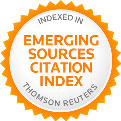Análisis de la capacidad de salto antes, durante y después de la competición en jugadores internacionales junior de baloncesto. (Analysis of jumping capacity before, during and after competition in international junior basketball players).
Resumen
El objetivo de este estudio fue valorar la disminución de la altura de salto en el test CMJ antes, durante y después de la competición en nueve jóvenes jugadores internacionales de baloncesto. Del mismo modo, se analizó la relación entre los minutos que cada jugador permanecía en cancha y la disminución de la capacidad de salto. Para ello, se evaluó la altura de salto mediante el CMJ en 8 momentos diferentes (antes y después del calentamiento, durante el descanso, inmediatamente después del partido y en los minutos 1’, 3’, 5’ y 7’ tras la finalización del encuentro) utilizando una plataforma de contacto. Para estimar la presencia de diferencias significativas entre los momentos se utilizó el análisis de la varianza (ANOVA) de una cola. Los resultados demuestran que la capacidad de salto empeoró progresivamente durante la competición (F = 89.29, p = 0), descendiendo durante el descanso de 52.7 cm a 50.2 cm (p < 0.05) y con valores de salto tras la finalización del partido de 49.0 cm (p < 0.05). Así mismo, la altura de salto fue disminuyendo después del final del partido, alcanzándose en la última toma (7’ después del final del partido) el peor resultado (42.2 ± 2.4 cm), lo cual supuso un descenso del rendimiento del 19.8 ±4.8 %. Por otro lado, no se observaron correlaciones significativas entre el tiempo en pista y la disminución de la capacidad de salto. La capacidad de salto de los jugadores se deteriora progresivamente durante y después de la competición.
Palabras clave: deportes de equipo; fatiga; jugadores jóvenes; alto nivel; salto vertical.
abstractThe main aim of this study was to assess the decrease in jump height in CMJ test before, during and after competition in international youth basketball. Equally, we examined the relationship between minutes played and the decline in jump capacity during the course of the match. To do this, we evaluated the jump height in CMJ by eight different times (before and after warm up, at rest, immediately after the game and within minutes 1', 3', 5 'and 7' after completion of the competition) using a contact platform. To estimate the presence of significant differences between the times we used a one – way analysis of variance (ANOVA). The results showed, that the jumping capacity decreased during competition (F = 89.29, p = 0), decrease during the rest of 52.7 cm to 50.2 cm (p < 0.05) and after completion of the match from 49.0 cm (p < 0.05). Similarly, jump height was decreased after the end of the match, reaching at the last measurement (7 'after the end of the competition) the worst result (42.2 ± 2.4 cm), which was a yield decrease of 19.8 ± 4.8 %. On the other hand, there was not correlation between play time and performance decline. The maximal jump capacity decreased during and after competition.
Key words: collective sports; fatigue; young players; top level; vertical jump.
doi:10.5232/ricyde2010.02105
---------------------------------------------------------------------
Referencias/references
Andersson, H.; Raastad, T.; Nilsson, J.; Paulsen, G.; Garthe, I., & Kadi, F. (2008). Neuromuscular fatigue and recovery in elite female soccer: effects of active recovery. Medicine and Science in Sports and Exercise, 40(2), 372-380.
doi:10.1249/mss.0b013e31815b8497
Ben Abdelkrim, N.; El Fazaa, S., & El Ati, J. (2007). Time-motion analysis and physiological data of elite under-19-year-old basketball players during competition. British Journal of Sports Medicine, 41(2), 69-75.
doi:10.1136/bjsm.2006.032318
PMid:17138630 PMCid:2658931
Bishop, D. (2003). Warm Up II: Performance Changes Following Active Warm Up and How to Structure the Warm Up. Sports Medicine, 33(7), 483-498
doi:10.2165/00007256-200333070-00002
PMid:12762825
Bosco, C.; Luhtanen, P., & Komi, V. (1983). A symple method for measurement of mechanical power in jumping. European Journal of Applied Physiology and Occupational Physiology, 50(2), 237-282.
doi:10.1007/BF00422166
Castagna, C.; Impellizzeri, F. M.; Rampinini, E.; D'Ottavio, S., & Manzi V. (2008). The Yo-Yo intermittent recovery test in basketball players. Journal of Science and Medicine in Sport, 11(2), 202-208.
doi:10.1016/j.jsams.2007.02.013
PMid:17574917
Glaister, M. (2005). Multiple sprint work: physiological responses, mechanisms of fatigue and the influence of aerobic fitness. Sports Medicine, 35(9), 757-777.
doi:10.2165/00007256-200535090-00003
PMid:16138786
McInnes, S. E.; Carlson, J. S.; Jones, C. J., & McKenna, M. J. (1995). Physiological load imposed on basketball players during competition. Journal of Sports Sciences, 13(5), 387-397.
doi:10.1080/02640419508732254
PMid:8558625
Montgomery, P.; Pyne, D.; Hopkins, W.; Dorman, J.; Cook, K., & Minahan, C. (2008). The effect of recovery strategies on physical performance and cumulative fatigue in competitive basketball. Journal of Sports Sciences, 26(11), 1135-1145.
doi:10.1080/02640410802104912
PMid:18608847
Narazaki, K.; Berg, N.; Stergiou, B., & Chen, B. (2009). Physiological demands of competitive basketball. Scandinavian Journal of Medicine and Science in Sports, 19(3), 425-432.
doi:10.1111/j.1600-0838.2008.00789.x
PMid:18397196
Rojas, F. J.; Cepero, M.; Oña, A., & Gutiérrez, M. (2000). Kinematic adjustments in the basketball jump shot against an opponent. Ergonomics, 43(10), 1651-1660.
doi:10.1080/001401300750004069
PMid:11083144
Thorlund, J. B.; Michalsik, L. B.; Madsen, K., & Aagaard, P. (2008). Acute fatigue-induced changes in muscle mechanical properties and neuromuscular activity in elite handball players following a handball match. Scandinavian Journal of Medicine and Science in Sports, 18(4), 462-472.
doi:10.1111/j.1600-0838.2007.00710.x
PMid:18028284
---------------------------------------------------------------------
Palabras clave/key words
Texto completo/Full Text:
PDF------------------------ 0 -------------------------
RICYDE. Revista Internacional de Ciencias del Deporte
![]()

Publisher: Ramón Cantó Alcaraz
ISSN:1885-3137 - Periodicidad Trimestral / Quarterly

